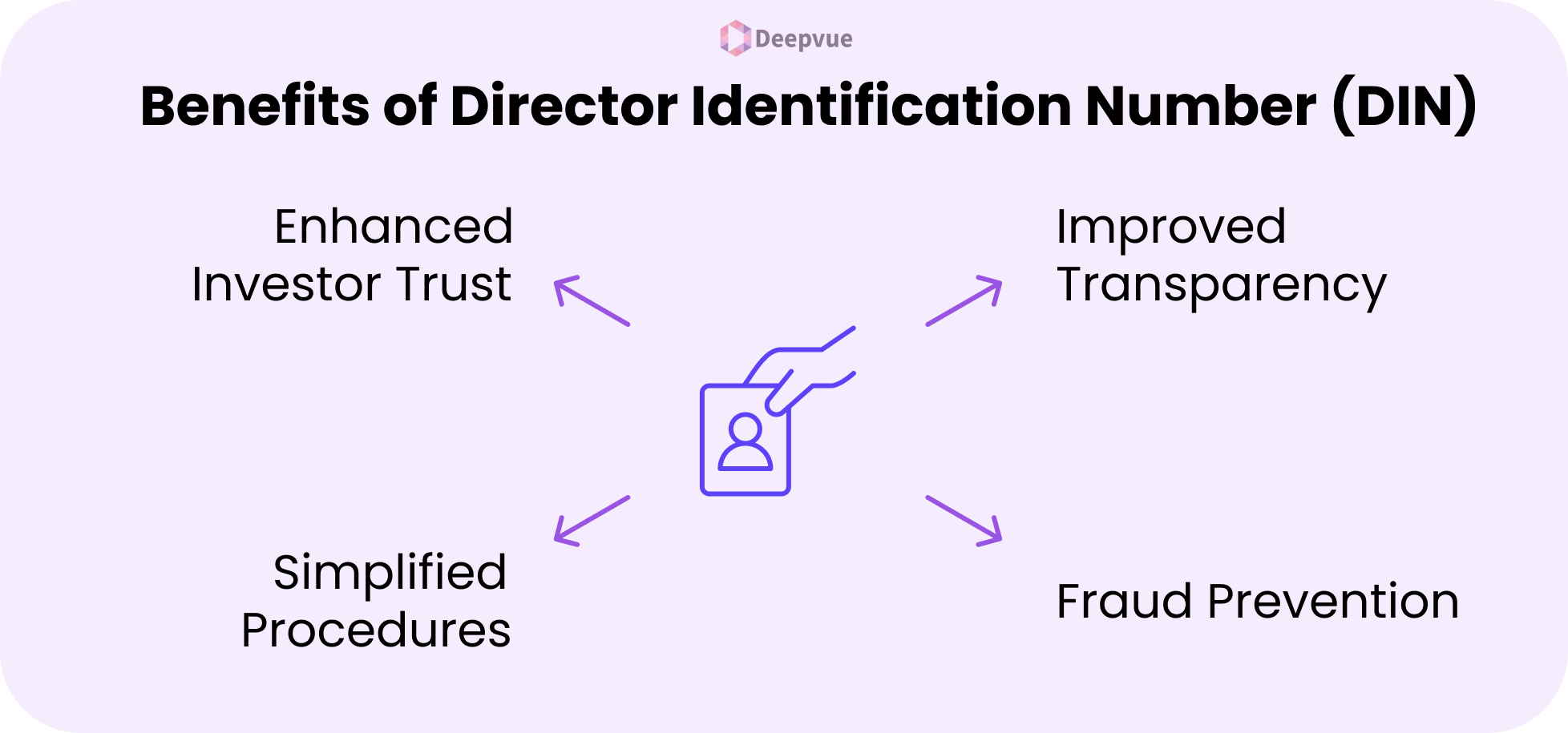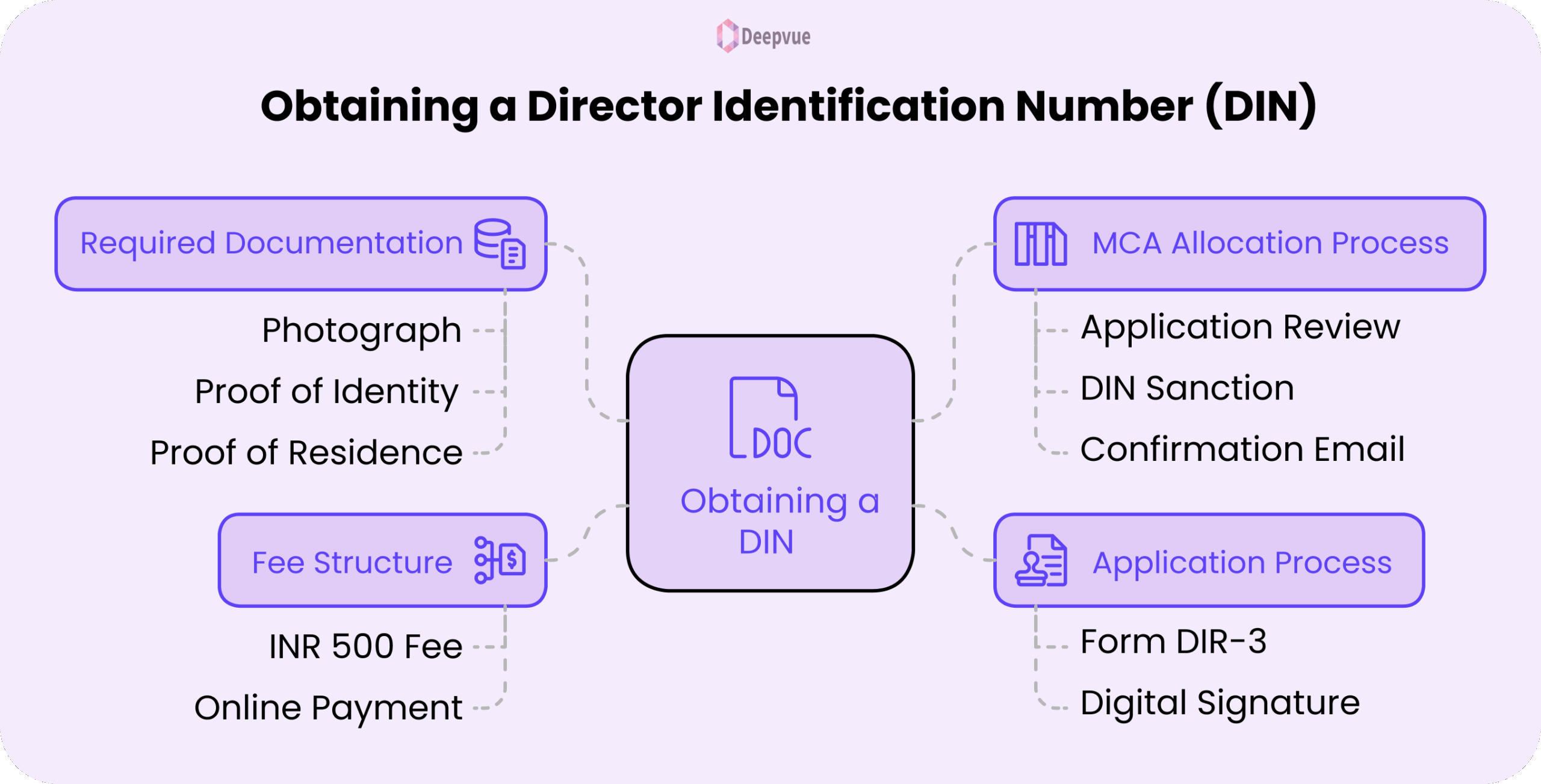All those who wish to be directors in an Indian company need to have a distinctive identification — the Director Identification Number (DIN). Enacted under the Companies Act, 2006, the DIN is an important regulatory device to monitor the participation of individuals across various companies in the country.
Whether it is an individual’s first appointment as a director or he/she has directorship in more than one entity, the DIN makes his/her identity and record traceable all the time. The system assists regulators, stakeholders, and financial institutions in confirming the credentials of a director, and therefore lowers the possibility of fraud, shell companies, and malpractices.
What is a Director Identification Number (DIN)?
A DIN is an 8-digit unique Director Identification Number given by the Ministry of Corporate Affairs (MCA), Government of India, to any person who is made a director in a company. The DIN, once given, is valid throughout the lifetime of the director and has to be quoted on all filings pertaining to the individual with the Registrar of Companies (ROC). It serves as a director’s digital identity so regulatory bodies and stakeholders can see their appointment history, resignation history, and compliance record in various companies.
Historical Background and Development
The concept of DIN was introduced under Sections 266A to 266G of the Companies (Amendment) Act, 2006, which later became Section 153 of the Companies Act, 2013. Earlier, there was no centralized process to identify and validate the credentials of directors of companies, and this used to result in problems like directorships under various names and a lack of accountability. The introduction of DIN was a big step towards enhancing corporate governance in the country. The Director Identification Number in company law has, over the years, been integrated with the MCA21 e-Governance platform, and the process of application and tracking has become efficient and accessible.
The Purpose and Importance of DIN

- Improving Transparency in Corporate Governance: DIN makes it possible for each director to have a single identity, which simplifies tracing their presence in various companies and improves accountability in corporate governance.
- Avoiding Fraudulent Operations: Assignment of a permanent identification number to directors prevents impersonation and appointment of non-existent persons as company directors, thus curtailing the possibility of corporate fraud.
- Simplification of Corporate Procedures: DIN makes regulatory filings and compliance easier through a single, uniform identifier for the director, obviating the requirement to furnish duplicate identity proofs for different filings.
- Enhancing Investor Trust: Having a tangible director identity system instills investor confidence because it fosters integrity, traceability, and transparency in corporate entities.
Legal Framework and Compliance
Role of DIN in Company Law
A Director Identification Number (DIN) is a unique identification number issued by the Ministry of Corporate Affairs (MCA) to individuals intending to become directors in Indian companies. As per the Companies Act, 2013, it is obligatory for all existing or proposed directors to receive a DIN before their appointment. This makes directors transparent, accountable, and traceable within the corporate environment.
Essential Requirements for Directors
To be eligible for appointment as a director under the Companies Act, a person must:
- Be at least 18 years of age
- Possess a valid DIN
- Not be disqualified under Section 164, such as being of unsound mind, insolvent, or convicted of an offense involving moral turpitude.
- In certain situations, fulfill residency requirements, for example, staying in India for a minimum of 182 days in the last preceding calendar year (for resident directors).
- Some organizations have pertinent qualifications or experience as stipulated in their Articles of Association or industry rules
Implications of Non-Compliance
Non-compliance with DIN requirements or director eligibility norms can lead to serious legal and financial consequences, including:
- Disqualification of the director under Section 164
- Penalties and fines on the company and directors as per Section 172
- Invalidation of board resolutions passed by improperly constituted boards
- Risk of prosecution and further action by the Registrar of Companies (RoC)
- Negative impact on the company’s compliance rating and credibility
How to Obtain a DIN?

Application Process and Digital Signature Requirement
- Apply for a DIN on Form DIR-3 (new directors) or SPICe+ (INC-32) (for incorporation of the company).
- A Class 2 or Class 3 Digital Signature Certificate (DSC) is required to submit the application online.
- The application should be digitally signed by the applicant and attested by a practicing professional (CA/CS/CMA) or an existing director of a company.
Required Documentation
- Photograph of the applicant.
- Proof of Identity (e.g., PAN card – compulsory in case of Indian nationals).
- Proof of Residence (passport, voter ID, utility bills).
- Board Resolution (if DIN is sought through an existing company).
- Applicant’s Digital Signature Certificate (DSC).
- Attestation of documents by a practicing professional (if necessary).
Fee Structure and Payment Process
- According to the recent MCA guidelines, the cost of submission of Form DIR-3 is INR 500.
- Online payment through credit/debit card, net banking, or NEFT is possible.
- On successful payment, a Service Request Number (SRN) is obtained for tracking purposes.
Process of Allocation by the Ministry of Corporate Affairs (MCA)
- Upon submission, the MCA checks the application and documents.
- If complete and correct, the DIN is sanctioned and allocated immediately.
- The applicant is issued a confirmation email with the DIN number.
- On discrepancies, MCA can issue resubmission or rejection notices, which have to be settled at the earliest.
Managing and Maintaining DIN
- Director Identification Number in company law is a unique identification number required for any individual intending to become a director in an Indian company.
- After an assignment, a DIN remains valid for the lifetime of the person and does not need renewal.
- Directors should keep their DIN active and updated with correct information.
Updating DIN Information
- Any alteration in details like name, address, nationality, or other personal information is to be updated through Form DIR-6.
- The latest details should be evidenced with self-attested documents (e.g., Aadhaar, PAN, passport, bills).
- The revised version should be signed electronically by the director and attested by a practicing professional (CA/CS/CMA).
Modification and Cancellation Procedures
- In case of incorrect details, modifications can be made through Form DIR-6 as long as valid supporting documents are provided.
- If a DIN is procured with fraud or allocated in duplicate, it can be cancelled by the MCA (Ministry of Corporate Affairs).
- Cancellation can also be made in the case of death, declaration as insolvent, or disqualification under the provisions of the Companies Act.
Legal Obligations for Maintaining Up-to-Date Records
- Directors have a statutory obligation to maintain their DIN records current and up-to-date with the MCA.
- Not updating DIN information can attract penalties under Section 266G of the Companies Act, 2013.
- DIR-3 KYC (Know Your Customer) filing is obligatory on an annual basis to keep the DIN active.
- Failure to comply with the KYC rules results in the deactivation of the DIN and a reactivation fine.
Practical Considerations for Directors
- Directors are required to have their personal and professional details correct and current with regulatory bodies.
- They ought to ensure adherence to KYC standards and corporate governance rules.
- Understanding obligations pursuant to such laws as the Companies Act, 2013 (India) is important for managing accountability and liability.
- Directors must be aware of electronic traceability using identifiers associated with their positions in various firms.
- Following proper documentation in the event of appointments, resignations, or disqualifications ensures transparency.
Importance of a Permanent, Non-Transferable Identifier
- A permanent identifier (like the DIN – Director Identification Number in India) provides a unique identity to each director across all companies.
- It assists in avoiding fraudulent or multiple appearances by the same person in different entities.
- Being non-transferable ensures that responsibility is individualized and can’t be handed over or passed on.
- Regulatory agencies can effectively monitor a director’s current and previous engagement with companies.
- It ensures transparency, facilitates ease of monitoring compliance, and fosters effective corporate governance.
Impacts on Director Appointments and Removals
- Appointments cannot be made without a genuine permanent identifier (e.g., DIN), keeping things legitimate.
- Background verification and eligibility checks are simpler and credible.
- Any banning or legal action against the identifier impacts subsequent appointments across all firms.
- Resignations and removals need to be recorded with the regulator against the same identifier to enable good records to be kept.
- The identifier supports ensuring that directors with bad records or with legal issues are able to be marked as such in different companies.
Conclusion
The Director Identification Number (DIN) is a pillar of corporate governance and transparency in India. By identifying directors uniquely for all the companies they are part of, DIN serves to curb fraudulent practices, ensure compliance, and have a trustworthy governance system.
In this regard, the utilization of sophisticated digital tools becomes imperative for smooth and precise verification. This is where our company’s identity verification API comes into play. Our API is specifically designed to simplify compliance and onboarding operations. With our API, companies can instantly verify director information against official databases, saving manual effort and preventing the risk of identity fraud.
FAQ
How do I obtain a Director Identification Number?
You can make an application for DIN by filing Form DIR-3 on the MCA portal, along with identity proof, address proof, and a digital signature certificate (DSC).
Who is qualified for DIN?
Any person who is going to be the director of a company incorporated in India is eligible to make an application for a DIN, with no restriction on nationality.
How do I locate my DIN number?
You can check your DIN by logging into the MCA portal and looking under the “MCA Services” option or through public records of the company, where your name is recorded as a director.
What are the advantages of a DIN number?
A DIN provides a unique identifier for every director, encourages corporate transparency, facilitates better tracking of directorships, and supports regulators in monitoring compliance and governance.








